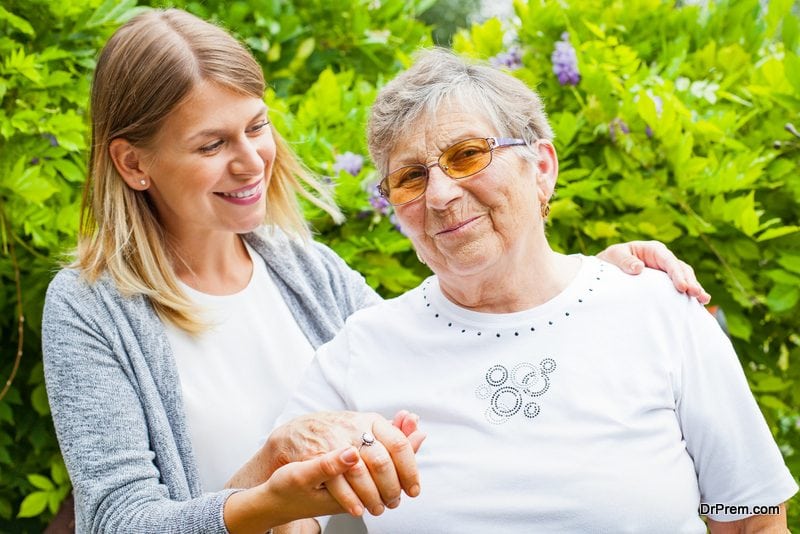Congratulations. You’ve decided to take on the great responsibility of caring for your ailing loved one in their home. This isn’t a position or responsibility to be taken lightly. It may require you to quit your job, accommodate your relative in your own home, or make renovations to their current living conditions. Perhaps you made this decision because the thought of admitting them into a an unfamiliar facility was too upsetting for you both. It takes a special person to care for their relative 24/7. Before you make this commitment, there are a few things to consider. Read on to discover what you need to know and how to prepare for being a caregiver to a relative in need.
Be Honest About Yours and Their Limitations
 Taking care of a loved one in your home is no easy task. And convincing yourself of it won’t benefit either of you. The first thing to consider is your love one’s medical condition. Determine how much care they need and if you’re willing and able to handle it. Here are a few questions to ask yourself:
Taking care of a loved one in your home is no easy task. And convincing yourself of it won’t benefit either of you. The first thing to consider is your love one’s medical condition. Determine how much care they need and if you’re willing and able to handle it. Here are a few questions to ask yourself:
- Are they able to walk/get around?
- Can they feed/dress/bathe themselves?
- Do they need certain medications? Can I administer them?
- Do they need a hospital bed or other equipment?
- Does their condition impair their mental state?
Some diagnoses, like dementia, affect a person’s cognitive abilities. Dementia patients can sometimes get frustrated, aggressive, and hostile. Ask yourself if this is something you’re prepared to deal with. Most medical diagnoses that require in-home care also require prescription medications. Find out if these are administered orally or using a needle. This will determine whether or not you can provide them the medicine they need. If cost is an issue, consider programs like prescription hope, that offer discounts on commonly prescribed medications.
Educate Yourself
The more knowledge you have about your loved ones medical condition and needs, the better prepared you’ll be to help them. You should also educate yourself on how to care for an ill relative. It’s not just about the physical care they need, but also maintaining your positive mental state. In-home care can become very emotionally demanding and taxing for family members. Watching your loved one’s condition decline and their inability to care for themselves is a very sad and difficult thing to experience. Support groups, therapists, and even other caregivers involved in your loved one’s treatment plan can help by offering support and information. When you feel overwhelmed, ask another friend or family member to stand in for you; even if it’s just for a few hours or a few moments. Everyone needs a break and taking them when needed will help you remain patient and attentive in the long run.
Prepare Your Family
 You need to prepare your family for the change that comes with in-home care of a loved one. Whether you’ll be spending time at your relative’s home or you plan to care for them in your own house, it will be a big adjustment for everyone. Quitting your job is a very big decision to make and one you should discuss with your family and spouse. Can you burden the financial responsibility of not working? How does your family feel about bringing the sick relative into the home? Young children may have a hard time understanding exactly what’s happening and you may not want them to see their loved one’s condition decline. Spending longs days and nights at the relatives home (if you choose to care for them there) also places other demands on your family. Your spouse or partner may need to pick up the slack in terms of childcare. Making the decision to care for a sick loved one should be discussed with the entire family.
You need to prepare your family for the change that comes with in-home care of a loved one. Whether you’ll be spending time at your relative’s home or you plan to care for them in your own house, it will be a big adjustment for everyone. Quitting your job is a very big decision to make and one you should discuss with your family and spouse. Can you burden the financial responsibility of not working? How does your family feel about bringing the sick relative into the home? Young children may have a hard time understanding exactly what’s happening and you may not want them to see their loved one’s condition decline. Spending longs days and nights at the relatives home (if you choose to care for them there) also places other demands on your family. Your spouse or partner may need to pick up the slack in terms of childcare. Making the decision to care for a sick loved one should be discussed with the entire family.
When you realize that your loved one needs in-home care, it can be a difficult thing to accept. But no care can replace care given by a family member. Your relative will undoubtedly feel at ease knowing someone they love and trust will be caring for them in their final days. But be sure to educate yourself about their condition and understand their physical and mental needs.
Article Submitted By Community Writer




